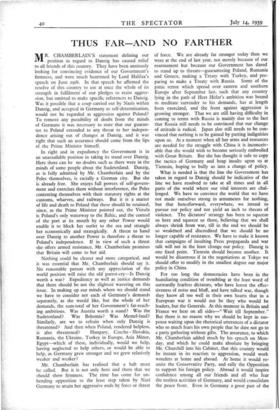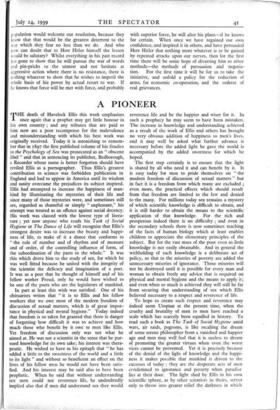THUS FAR AND NO FARTHER
MR. CHAMBERLAIN'S statement defining our position in regard to Danzig has caused relief to all friends of this country. They have been anxiously looking for convincing evidence of our Government's firmness, and were much heartened by Lord Halifax's speech on June 29th. In that speech he affirmed the resolve of this country to use at once the whole of its strength in fulfilment of our pledges to resist aggres- sion, but omitted to make specific references to Danzig. Was it possible that a coup carried out by Nazis within Danzig, and accepted in Germany as self-determination, would not be regarded as aggression against Poland? To remove any possibility of doubt from the minds of Germans it was necessary to state that our guaran- tee to Poland extended to any threat to her indepen- dence arising out of changes at Danzig, and it was right that such an assurance should come from the lips of the Prime Minister himself.
In right and in expediency the Government is in an unassailable position in taking its stand over Danzig. Here there can be no doubts such as there were in the minds of some people about the Sudetenland. Danzig, as is fully admitted by Mr. Chamberlain and by the Poles themselves, is racially a German city. But she is already free. She enjoys full powers of self-govern- ment and exercises them without interference, the Poles contenting themselves with their statutory rights at the customs, wharves, and railways. But it is a matter of life and death to Poland that these should be retained, since, as the Prime Minister pointed out, the Vistula is Poland's only waterway to the Baltic, and the control of the port at its mouth by any other Power would enable it to block her outlet to the sea and strangle her economically and strategically. A threat to hand over Danzig to another Power is therefore a threat to Poland's independence. If in view of such a threat she offers armed resistance, Mr. Chamberlain promises that Britain will come to her aid.
Nothing could be clearer and more categorical, and it was essential that Mr. Chamberlain should say it. No reasonable person with any appreciation of the world position will raise the old parrot-cry—Is Danzig worth a war? Expediency as well as justice demands that there should be not the slightest wavering on this issue. In making up our minds where we should stand we have to consider not each of Germany's demands separately, as she would like, but the whole of her demands, the sum-total of her Government's far-reach- ing ambitions. Was Austria worth a stand? Was the Sudetenland? Was Bohemia? Was Memel-land? Similarly, are we to refrain when only Danzig is threatened? And then when Poland, rendered helpless, is also threatened? Hungary, Czecho - Slovakia, Rumania, the Ukraine, Turkey in Europe, Asia Minor, Egypt—which of these, individually, would we help, having neglected to help others, or would be able to help, as Germany grew stronger and we grew relatively weaker and weaker?
Mr. Chamberlain has realised that a halt must be called. But it is not only here and there that we should show firmness. The time has come for un- bending opposition to the least step taken by Nazi Germany to attain her aggressive ends by force or threat of force. We are already far stronger today than we were at the end of last year, not merely because of our rearmament but because our Government has dared to stand up to threats—guaranteeing Poland, Rumania and Greece, making a Treaty with Turkey, and pre- paring to make a Treaty with Russia. Some of the panic terror which spread over eastern and southern Europe after September last, such that any country lying in the path of Herr Hitler's ambition was bound to meditate surrender to his demands, has at length been exorcized, and the front against aggression is growing stronger. That we are still having difficulty in coming to terms with Russia is mainly due to the fact that Russia still needs to be convinced that our change of attitude is radical. Japan also still needs to be con- vinced that nothing is to be gained by putting indignities upon us. At a moment when all her arms and resources are needed for the struggle with China it is inconceiv- able that she would wish to become seriously embroiled with Great Britain. But she has thought it safe to copy the tactics of Germany and heap insults upon us at Tientsin, hoping to bully us into a change of policy.
What is needed is that the line the Government has taken in regard to Danzig should be indicative of the line we have resolved to take at all times and in all parts of the world where our vital interests are chal- lenged. We have to convince the world that we have not made ourselves strong in armaments for nothing, but that henceforward, everywhere, we intend to pursue our policy and not yield an inch to threats of violence. The dictators' strategy has been to squeeze us here and squeeze us there, believing that we shall always shrink from war, till in the end we should be so weakened and discredited that we should be no longer capable of resistance. We have to make it known that campaigns of insulting Press propaganda and war talk will not in the least change our policy. Danzig is one fixed point. Tientsin should become another. It would be disastrous if in the negotiations at Tokyo we should offer to modify in the smallest degree our major policy in China.
For too long the democracies have been in the humiliating condition of trembling at the least word of outwardly fearless dictators, who have learnt the effec- tiveness of noise and bluff, and have talked war, though they know all too well in their own hearts that in a European war it would not be they who would be leaders, but the Generals. At this moment in Britain and France we hear on all sides—" Wait till September." But there is no reason why we should be kept in sus- pense waiting upon the rhetorical utterances of a dictator who so much fears his own people that he dare not go to a party gathering without gifts. The assurance, to which Mr. Chamberlain added much by his speech on Mon- day, and which he could make absolute by bringing Mr. Churchill into his Cabinet, that this country would be instant in its reaction to aggression, would work wonders at home and abroad. At home it would re- unite the Conservative Party, and rally the Opposition to support his foreign policy. Abroad it would inspire confidence among all our friends and all who fear the restless activities of Germany, and would consolidate the peace front. Even in Germany a great part of the population would welcome our resolution, because they know that that would be the greatest deterrent to the war which they fear no less than we do. And who now can doubt that to Herr Hitler himself the lesson would be salutary? Whilst everything in his past record has gone to show that he will pursue the war of words and pin-pricks to the utmost and not hesitate at aggressive action where there is no resistance, there is nothing whatever to show that he wishes to imperil the ‘A hole basis of his power by actual resort to war. If he knows that force will be met with force, and probably with superior force, he will alter his plans—if he knows for certain. When once we have regained our own confidence, and inspired it in others, and have persuaded Herr Hitler that nothing more whatever is to be gained by repeated attacks upon our nerves, then for the first time there will be some hope of diverting him to other methods—the methods of persuasion and negotia- tion. For the first time it will be for us to take the initiative, and unfold a policy for the reduction of arms, for economic co-operation, and the redress of real grievances.











































 Previous page
Previous page